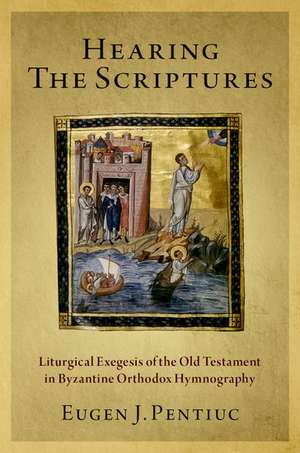Hearing the Scriptures: Liturgical Exegesis of the Old Testament in Byzantine Orthodox Hymnography
Autor Eugen J. Pentiucen Limba Engleză Paperback – 5 ian 2022
Preț: 194.09 lei
Preț vechi: 218.85 lei
-11% Nou
Puncte Express: 291
Preț estimativ în valută:
37.15€ • 40.37$ • 31.23£
37.15€ • 40.37$ • 31.23£
Carte tipărită la comandă
Livrare economică 09-15 aprilie
Preluare comenzi: 021 569.72.76
Specificații
ISBN-13: 9780190239640
ISBN-10: 0190239646
Pagini: 450
Dimensiuni: 157 x 237 x 27 mm
Greutate: 0.64 kg
Editura: Oxford University Press
Colecția OUP USA
Locul publicării:New York, United States
ISBN-10: 0190239646
Pagini: 450
Dimensiuni: 157 x 237 x 27 mm
Greutate: 0.64 kg
Editura: Oxford University Press
Colecția OUP USA
Locul publicării:New York, United States
Recenzii
A wonderfully illuminating guide to the ways in which the Greek hymnographers for Holy Week interact with, and interpret, the biblical text, this detailed analytical work on Byzantine hymnography is especially valuable since its author is both a biblical scholar and linguist.
This learned work is a much-needed examination of the scriptural sources that inform the content of the liturgical poetry of the Orthodox Church. Such a task requires a good knowledge of the Greek church and the Biblical text. Few scholars can handle both sides of this equation, but in Eugen Pentiuc the reader will find a superb guide.
For most people throughout history Scripture has been mediated primarily through the Church's worship; the liturgical hermeneutics of the Bible largely waits to be explored. This is particularly true for the rich Byzantine hymnography so famously characteristic of Orthodox tradition. With his profound expertise in biblical exegesis and intimate familiarity with Orthodox hymnography, Pentiuc's new book on liturgical hermeneutics of the Bible fills a gap for scholars and a wider readership alike.
In this learned and innovative study, Pentiuc brilliantly analogizes hymnic use of the Bible to cubism, in contrast to more representational patristic exegesis. A very important contribution to the Bible's reception history.
This book constitutes a major contribution to scholarship... it will become a standard reference work for scholars and students, teachers and preachers interested in Byzantine hymnography as a privilege entry-point into understanding how early Christians encountered the Scriptures.
This learned work is a much-needed examination of the scriptural sources that inform the content of the liturgical poetry of the Orthodox Church. Such a task requires a good knowledge of the Greek church and the Biblical text. Few scholars can handle both sides of this equation, but in Eugen Pentiuc the reader will find a superb guide.
For most people throughout history Scripture has been mediated primarily through the Church's worship; the liturgical hermeneutics of the Bible largely waits to be explored. This is particularly true for the rich Byzantine hymnography so famously characteristic of Orthodox tradition. With his profound expertise in biblical exegesis and intimate familiarity with Orthodox hymnography, Pentiuc's new book on liturgical hermeneutics of the Bible fills a gap for scholars and a wider readership alike.
In this learned and innovative study, Pentiuc brilliantly analogizes hymnic use of the Bible to cubism, in contrast to more representational patristic exegesis. A very important contribution to the Bible's reception history.
This book constitutes a major contribution to scholarship... it will become a standard reference work for scholars and students, teachers and preachers interested in Byzantine hymnography as a privilege entry-point into understanding how early Christians encountered the Scriptures.
Notă biografică
Eugen J. Pentiuc is the Archbishop Demetrios Chair of Biblical Studies and Early Christianity as well as a Professor of Old Testament and Semitic Languages at Holy Cross Greek Orthodox School of Theology. He is the author of The Old Testament in Eastern Orthodox Tradition and numerous other works.
